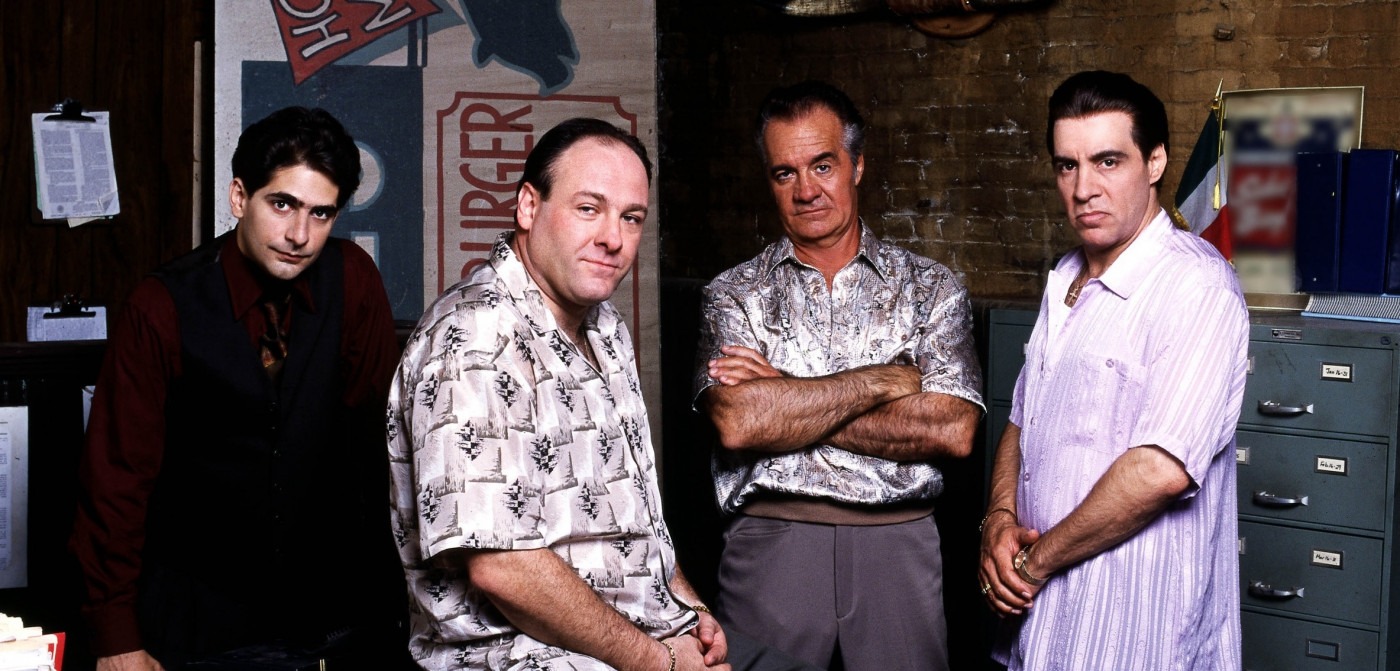The Sopranos’ brilliance remains untarnished 25 years on
A guy walked into a psychiatrist’s office and changed TV … wait, no. That one’s been done before.
What’s to say about the show that’s already had everything said about it and more? Where to begin in assessing the legacy of the seminal crime drama, the quintessential mafia show, the series that sparked the golden age of television?
Start at the beginning. That opening scene where Tony Soprano, Don of New Jersey, husband to a wife and father to two kids, sits in the waiting room of a psychiatrist’s office already contains everything you need to know about the show which is to follow. The very first frame, a low-angled upward-facing shot of a statuette of a topless woman, contains within it a myriad of possible interpretations, each hinting in different ways at Tony’s troubled relationship to women and mother figures. It’s the kind of artsy shot that had previously been reserved for the big screen but which later TV directors, following Chase’s example, would replicate and expand upon.
David Chase is in complete control of what his characters
and his story are saying
In the ensuing scene, we meet the calm and professional psychiatrist Dr. Jennifer Melfi, and she and Tony begin to unpack the messy life of a gangster family man living in modern America. In the process, we catch a glimpse of the show’s setting in the New Jersey suburbs and of the diverse ensemble of characters, from both family and “the family”, who populate it. Among these is Tony’s wife, Carmela, the archetypal blueprint for future TV gangster wives with a complex personal, financial, and moral relationship to their husband’s criminality, such as Breaking Bad’s Skyler White. And of course, there’s Livia Soprano, Tony’s cold, manipulative mother, whose brutal parenting has left him with so many of the emotional scars he’s in therapy to address (although he himself may not even be conscious of them).
All of this is introduced obliquely, with Melfi having to work hard to pry every personal confession out of Tony and the two of them dancing tantalisingly around the criminal element the whole time. The script is never heavy-handed or too direct, nor does it ever feel meandering or aimless. You can tell that writer and series creator David Chase is in complete control of what his characters and his story are saying.
The collision of these two sides of Tony was revolutionary. Having a TV show whose protagonist was a loving and devoted father who also committed savage acts of on-screen violence was unheard of
Across six seasons (or seven, depending on who you ask), Chase and his team continued to deploy all the facets that make those opening ten minutes of the pilot such a joy to watch, doubling down on the show’s idiosyncratic voice, honing its peculiar narrative style, and continuing to bring its world and characters into sharper focus. The show produced so many brilliant and ground-breaking moments that it’s impossible to recount them all here, but among the highlights is “Episode 5 of Season 1”, in which Tony executes a former-mobster-turned-government-witness while on a college tour upstate with his daughter. The murder is brutal and shocking, all the more so because Tony has briefly abandoned his daughter under a flimsy pretence to commit it.
The collision of these two sides of Tony was revolutionary. Having a TV show whose protagonist was a loving and devoted father who also committed savage acts of on-screen violence was unheard of. The scene was so shocking that HBO’s President, Chris Albrecht, actually phoned David Chase to warn him not to include it, predicting that it would be a disaster. Fortunately, Chase didn’t listen. The episode stands as a testament to the bold, forward-thinking disregard that he and his team showed for the stifling limitations that plagued the television industry at the time. It’s my favourite episode of any television show ever.
Why does this show, of all others, deserve to be remembered?
“So what?”, you might ask. Hopefully by now I’ve convinced you that The Sopranos is a great TV show, but why does that mean it’s still worth talking about, 25 years after it first aired in 1999? Why does this show, of all others, deserve to be remembered and celebrated outside of a small circle of nerds and superfans so long after its time? The show is fantastic, but so are many shows that aired before or after and have since been forgotten.
The Sopranos’ game-changing brilliance lay in the way it straddled the boundaries of what was considered ‘high-art’ and pop culture. You could watch it for the thoughtful psychoanalytical angle, the clever writing and cinematography, or just for some good old-fashioned gangster thrills. Or, as was probably the case with a lot of viewers, some combination of all three. Few shows before or since have so adroitly balanced critical acclaim and popular appeal. It flaunted all the rules that confined television to an inferior medium, proving that it could be just as meaningful and worthwhile as anything you saw on the big screen. Yet if that was all it had done, it might have been relegated to the margins of history, an interesting yet, ultimately, insignificant experiment. It was the show’s massive appeal to a broad audience that made it so significant. It was a cultural phenomenon. Suddenly, TV executives across all networks were looking for the next Sopranos. The show’s success proved that the innovations it introduced could be commercially viable as well, and this in turn paved the way for our current golden age of television. Everything that has come after it owes a debt to the ground-breaking show, to what was started when, on 10 January, 1999, Tony Soprano walked into a psychiatrist’s office. We are literally still watching its legacy unfold today. That is the reason, even 25 years after it first aired, The Sopranos is worth celebrating.

Comments